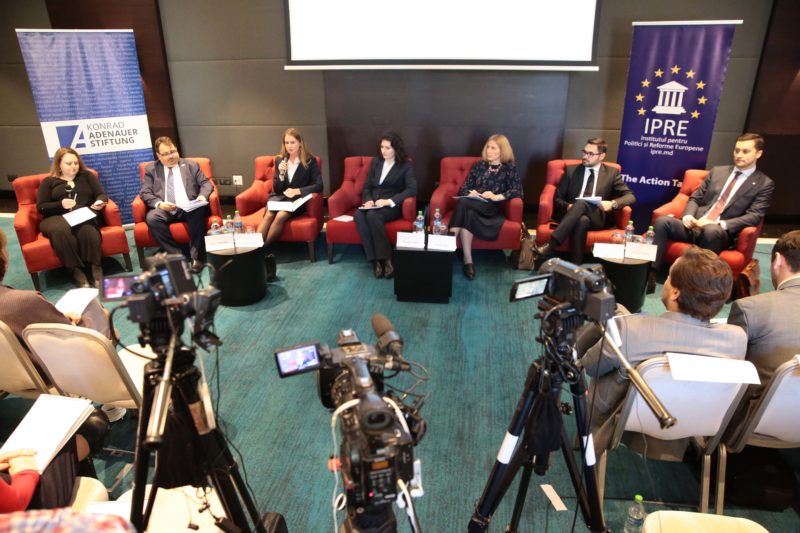Five years of implementation: A new Shadow Report outlining main progress, constraints and priorities in the implementation of the Association Agreement between the Republic of Moldova and European Union

After five years of implementation of the Association Agreement, today the sectoral cooperation between the European Union and the Republic of Moldova is further strengthened, in particular in the fields of research, innovation and education. The benefits were also enhanced by the visa-free regime with the EU, launched on April 28, 2014. Cooperation in the field of foreign policy and security has been deepened. However, the functioning of democratic institutions, the strengthening of the rule of law and the independence of justice have not undergone clear changes, which has severely affected the quality of the EU-Moldova dialogue, implicitly the full use of European support.
These are the main findings of the „Shadow Report: 5 years of implementation of the EU-Moldova Association Agreement (2014-2019) – Progress. Constraints. Priorities”, presented on October 30, by experts from the Institute for European Policies and Reforms (IPRE) and the Independent Analytical Centre “Expert-Grup”, organized with the support of the Konrad Adenauer Foundation (KAS).
Despite certain constraints, largely due to the Deep and Comprehensive Free Trade Area (DCFTA), the Republic of Moldova today is significantly closer economically to the European Union. The EU has become the country’s main economic partner. Today, about 70% of Moldovan exports are directed to the European Union market, and imports represent almost 50%. The net impact of exports to the EU is estimated at over 367 million euros, contributing to the creation of over 15,000 jobs and helping increase the budget revenues by 5% and by 320 million euros in investments in the private sector.
Ambassador Peter Michalko, Head of the EU Delegation to the Republic of Moldova: “We all want to be more strategic in the next five years, especially when at the EU level the planning of a new financial instrument for international development and cooperation for the period 2021-2027 is being discussed. Moreover, we will start updating the joint program document for Moldova at the EU level and work on the new Association Agenda during next year. This means a foreseeable strategic planning framework for the Republic of Moldova, as well as a certain governmental, legal and administrative stability. I refer to the Development Strategy Moldova 2030, to the multiannual budget planning framework 2019-2021, but also to the current political constraints that do not allow the formulation of a detailed government program for the four-year European cycle. We, therefore, encourage the parliamentary coalition and the Government to assure stability, which will allow us to synergistically and strategically set new priorities in the EU’s relationship with Moldova. Of course, the main focus of the government must remain to meet the needs and expectations of the citizens of the Republic of Moldova.”
Ionela Costachi, State Secretary at the Ministry of Economy and Infrastructure: “An ex-post analysis is necessary for the authorities to be able to evaluate the public policy measures we are promoting, and also to see where we can focus, so that we have a real and positive impact on the economy. We are glad that, after a thorough analysis, those myths about the possible economic shocks following the implementation of the DCFTA disappeared. Today the EU is the main trading partner of the Republic of Moldova and the statistics, together with the activity of the business environment, confirm it. At the same time, no matter how much we would like to point to the positive impact on the economy, we must also look at the existing constrains.”
The potential offered by the Association Agreement and by the Deep and Comprehensive Free Trade Area is still be fully explored. The key to progress in this regard remains the existence of a clear and consistent political will in implementing all the provisions of the Association Agreement. This means that the results of the reforms must contribute to the sustainable development of the country, bring more visible benefits to the citizens and help the continuous integration of the Republic of Moldova with the European Union.
Daniela Cujba, Head of the European Integration Directorate, Ministry of Foreign Affairs and European Integration: “2019 is an important year because we have all seen that the Association Agreement is an expression of the complexity of the European Integration processes taking place within the EU, and it is the objective of the Republic of Moldova to become part of these processes. The implementation of the Association Agreement implies to a great extent the efforts and the sustainable actions of the authorities. The findings of the report are very detailed and confirm the diverse and uneven nature of the Agreement, pointing to areas where important results have been achieved and to those where more can be achieved. This makes us confident that the implementation of the Agreement will require more effort and constant commitment from the authorities, but also a dialogue with our external partners”.
The event was attended by representatives of public authorities, foreign diplomats accredited in the Republic of Moldova, civil society and mass-media.
The Shadow Report is available in electronic version in Romanian, Russian, and English.
For more details, the video recording of the event is available here.
The present Report was developed within the IPRE Project “Monitoring of the Implementation of the Association Agreement between the Republic of Moldova and the European Union”, implemented with the support of the Konrad Adenauer Foundation (KAS). The development of the Report was also possible due to the co-financing from Expert-Grup and IPRE institutional funds. IPRE monitors the implementation of the EU-Moldova Association Agreement since 2015.



















